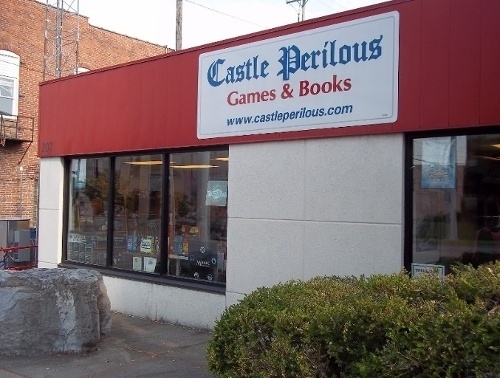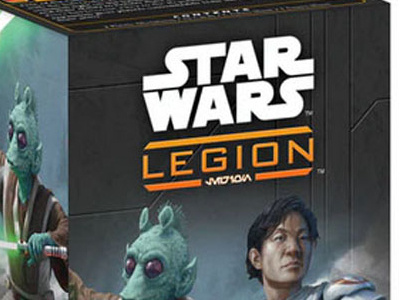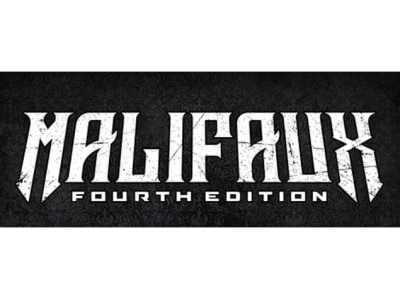Rolling for Initiative is a weekly column by Scott Thorne, PhD, owner of Castle Perilous Games & Books in Carbondale, Illinois and instructor in marketing at Southeast Missouri State University. This week, Thorne takes a look at three games that stood out to him at Gen Con.
Sent a staff member to Gen Con for the fourth or fifth year in a row and so far the following new releases have really piqued his (and my) interest:
KeyForge from Fantasy Flight Games. (See "Richard Garfield’s ‘KeyForge’ Puts a New Spin on ‘Unique’") This one is the hardest of the lot to describe. It’s designed by Richard Garfield so the mechanics should prove sound, but the description on the FFG website doesn’t give a clear explanation of gameplay: "KeyForge is a Unique Deck Game from the imagination of Richard Garfield that invites you to enter the Crucible, an artificial world where anything is possible. Here, you become a mighty Archon racing to unlock the Crucible’s hidden vaults and doing battle with one-of-a-kind decks, each filled with pieces of the countless planets and civilizations that make up this world. By using the creatures, artifacts, and abilities within your deck, you can stave off your opponent, gather Æmber, and use this crucial component to forge keys that will unlock the vaults. The first Archon to forge three keys earns victory!"
As near as I can figure out, the USP (unique selling point) of the game is that every, and as far as I understand that means EVERY, deck is unique. Again, from the website: "You can expand your arsenal with Call of the Archons Archon Decks, each of which offers a full play experience without the need for deckbuilding or boosters. Each Archon Deck is completely one-of-a-kind, unlike any other deck in existence." The way I understand it, you do not even need the starter set to play. As long as you have a set of the rules, you can grab a booster “deck” and start playing with it as every deck you buy will be unique, rather like the old Magic Tournament Decks. This sounds like a cool concept but I have seen other cool concepts arrive with a bang and fade away.
Star Trek and Star Trek TNG Fluxx. (see "Two ‘Star Trek’ Fluxx Games") Looney Labs has come out with licensed versions of their basic Fluxx game for years now, but I haven’t seen the level of interest people have shown in the Trek Fluxx versions since the first licensed version, Monty Python and the Holy Grail, released almost 10 years ago. Given the positive response Star Trek Discovery has received and the announcement that Patrick Stewart will return to play Jean-Luc Picard (see "Patrick Stewart Returns to 'Star Trek'"), Looney Labs has picked a great time to come out with their licensed Fluxx versions.
Pathfinder Playtest Edition. Seriously. When Paizo announced it would sell a playtest edition of the 2nd edition of the Pathfinder RPG (see "Paizo Kicks Off ‘Pathfinder 2E’") so that players could pay for the privilege of playtesting the new and updated rules for the game (even though there is a free copy downloadable from the website), I pooh-poohed the idea, to put it mildly. Given that they can get the playtest edition free, why pay for a print copy? Once again, as happens fairly regularly, I was wrong. As in the past, Paizo (and Looney Labs but not FFG) shipped their release so that we could have them on the shelf day-and-date with their release at Gen Con and we sold out of the Pathfinder Playtest edition within 48 hours and we had a couple of Pathfinder players discuss running playtest sessions here.
There are a slew of other new releases there as well, like Bad Doctor, Remnants and some 200 other games showing up there and on store shelves over the next month or so.
The opinions expressed in this column are solely those of the writer, and do not necessarily reflect the views of the editorial staff of ICv2.com.

Column by Scott Thorne
Posted by Scott Thorne on August 6, 2018 @ 1:37 am CT
MORE GAMES
New Clone Troopers Sets and Jedi General and Knight Set
July 15, 2025
Atomic Mass Games announced four new Star Wars: Legion miniatures expansion packs, for release into retail.
Scheme and Strategy Rules Receive an Update
July 15, 2025
Wyrd Games will release Malifaux 4E: Core Book for the popular horror miniatures game.
MORE COLUMNS
Column by Rob Salkowitz
July 14, 2025
Superman isn't a character who needs a general introduction to the broader public; he just needs an existing global fanbase to take a fresh look.
Column by Scott Thorne
July 14, 2025
This week, columnist Scott Thorne discusses Green Ronin Publishing's GoFundMe to fund its legal fight against Diamond Comic Distributors, and the soft preorders for the latest Horus Heresy box.








